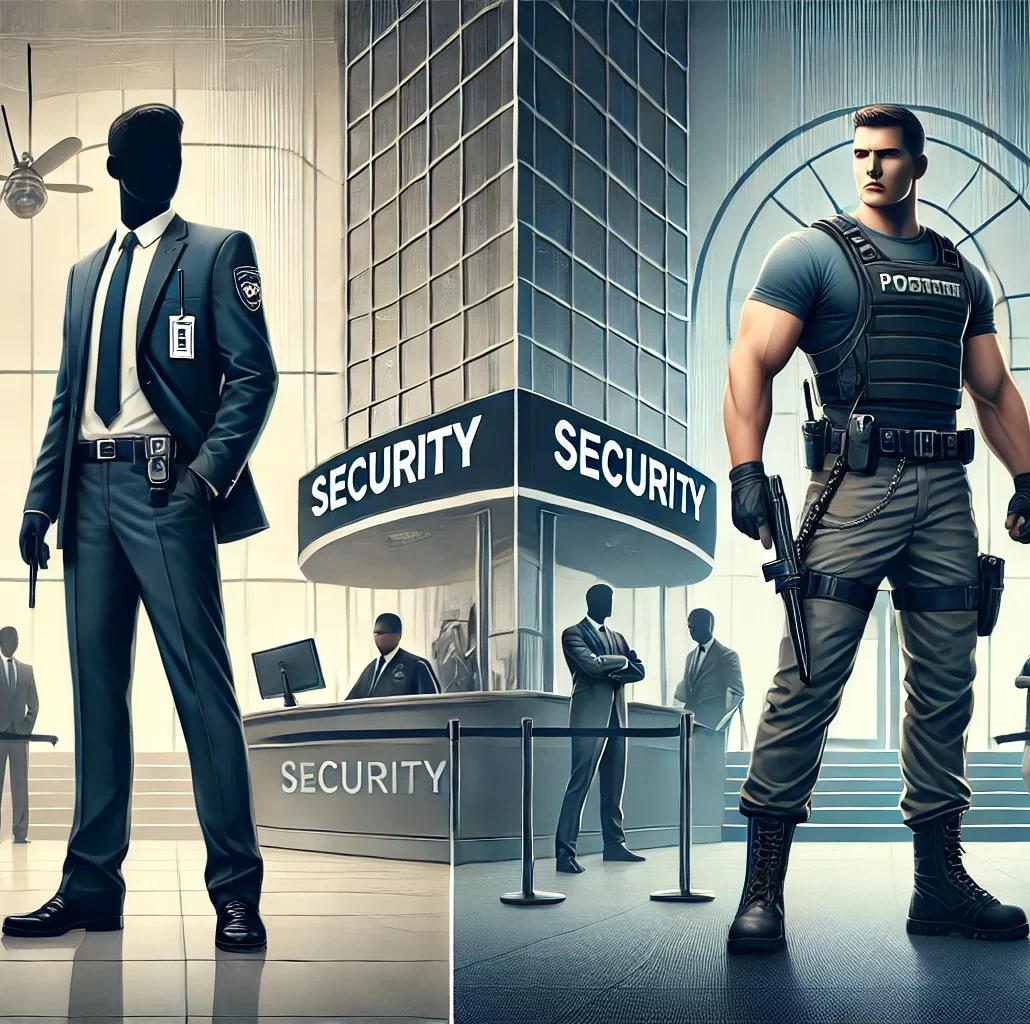Security guards and bouncers both play essential roles in keeping places safe, but their responsibilities and areas of work can be quite different. Knowing the distinct roles of each can help businesses and individuals understand the type of security they need and how each role contributes to a safer environment.
What is a Security Guard?
Security guards are responsible for maintaining safety and order in various settings, including businesses, offices, hospitals, schools, and public spaces. Their primary goal is to protect people, property, and valuable assets.
- Surveillance and Monitoring: Security guards monitor security cameras, alarm systems, and activity around their assigned area to prevent issues before they arise.
- Patrolling the Area: They conduct regular patrols to check for unusual activity, ensuring doors, windows, and entry points are secure.
- Access Control: Security guards manage access to buildings or specific areas, checking IDs, badges, or permits to ensure only authorized individuals enter.
- Emergency Response: In case of emergencies, security guards are trained to handle situations, such as fire alarms or medical incidents, quickly and efficiently.
What is a Bouncer?
Bouncers, also known as doormen or security guards in nightlife venues, typically work at bars, clubs, concerts, and events. Their role focuses on maintaining order and ensuring a safe environment for guests.
- Checking IDs at the Door: Bouncers control entry, ensuring only patrons of legal age are allowed into venues where alcohol is served.
- Managing Crowds: In crowded venues, bouncers prevent overcrowding, manage lines, and ensure safe and orderly entry and exit for guests.
- Handling Conflicts: Bouncers handle any disruptive behaviour, such as fights or arguments, and work to de-escalate situations to avoid harm to patrons or staff.
- Ejecting Problematic Individuals: If a guest becomes aggressive or overly intoxicated, bouncers are responsible for removing them from the premises to maintain a safe atmosphere for others.
Also Read:- How Security Guards Can Help Prevent Workplace Violence
Key Differences Between Security Guards and Bouncers
While both roles aim to keep spaces safe, the scope and focus of their duties differ.
1. Location and Environment
- Security Guards: Work in a variety of places, including office buildings, shopping malls, hospitals, and other public and private locations. They often provide security over a larger, more complex area.
- Bouncers: Primarily work in nightlife settings like clubs, bars, and concert venues. They focus on smaller, high-energy spaces with large groups of people.
2. Focus on Their Responsibilities
- Security Guards: Aim to protect people and property by actively monitoring surroundings, controlling access, and responding to any suspicious activity. Their work involves a wide range of tasks, from checking alarms to patrolling.
- Bouncers: Focus on crowd control and handling conflicts. Their responsibilities centre on maintaining a safe, enjoyable environment for guests in high-energy, sometimes unpredictable settings.
3. Types of Training
- Security Guards: Receive formal training in areas like emergency response, fire safety, surveillance, and legal procedures. They may be certified and undergo background checks to meet safety standards.
- Bouncers: Often receive training in conflict resolution, crowd management, and basic self-defence to help them manage physical altercations or disputes among patrons.
4. Skills Needed for Security Guards
Security guards require a specific set of skills to perform their duties effectively.
- Attention to Detail: Security guards must remain alert, noticing small changes or unusual behavior that could signal a security issue.
- Communication Skills: They must be able to communicate clearly with the public, management, and law enforcement if necessary.
- Patience and Professionalism: Security guards often deal with people in tense situations, so staying calm and professional is essential.
- Basic First Aid Knowledge: Many security guards are trained in basic first aid, allowing them to respond to medical emergencies quickly.
5. Skills Needed for Bouncers
Bouncers require a different set of skills that fit the needs of high-energy, crowded environments.
- Physical Fitness: Bouncers often need physical strength and stamina, as they may need to intervene in physical altercations or remove individuals from the premises.
- Conflict Resolution Skills: Bouncers must handle disputes calmly, avoiding escalation while maintaining order and safety.
- Crowd Management: In busy venues, bouncers must ensure people enter and exit safely, managing lines and preventing overcrowding.
- Observational Skills: Bouncers monitor patrons’ behaviour closely, detecting signs of trouble before it escalates.
Also Read:- The Role of Security Audits in Preventing Corporate Sabotage
How to Decide Which Type of Security You Need
Knowing when to hire a security guard versus a bouncer depends on the nature of your business and the type of security required.
1. Consider the Venue’s Environment
- Corporate or Public Settings: A security guard is usually more suitable for places like offices, malls, or schools due to their broader range of skills and training in monitoring, patrolling, and emergency response.
- Nightlife or High-Energy Venues: Bouncers are ideal for bars, clubs, or concerts due to their experience in crowd control, conflict management, and maintaining a safe, enjoyable environment.
2. Determine the Security Needs
- Protection of Assets and Property: Security guards are trained to protect buildings, property, and assets, making them the right choice for locations that require ongoing monitoring.
- Managing People and Preventing Disruptions: Bouncers are skilled at handling large crowds and preventing conflicts, making them better suited for venues with high foot traffic and potential rowdy behaviour.
Conclusion
Both security guards and bouncers play valuable roles in creating safe, secure spaces. Security guards are ideal for broader settings that require vigilant monitoring and asset protection, while bouncers are essential in nightlife environments for managing crowds and handling conflicts. By understanding the unique roles and skills of each, businesses can make the right choice for their security needs and ensure a safe experience for everyone.

